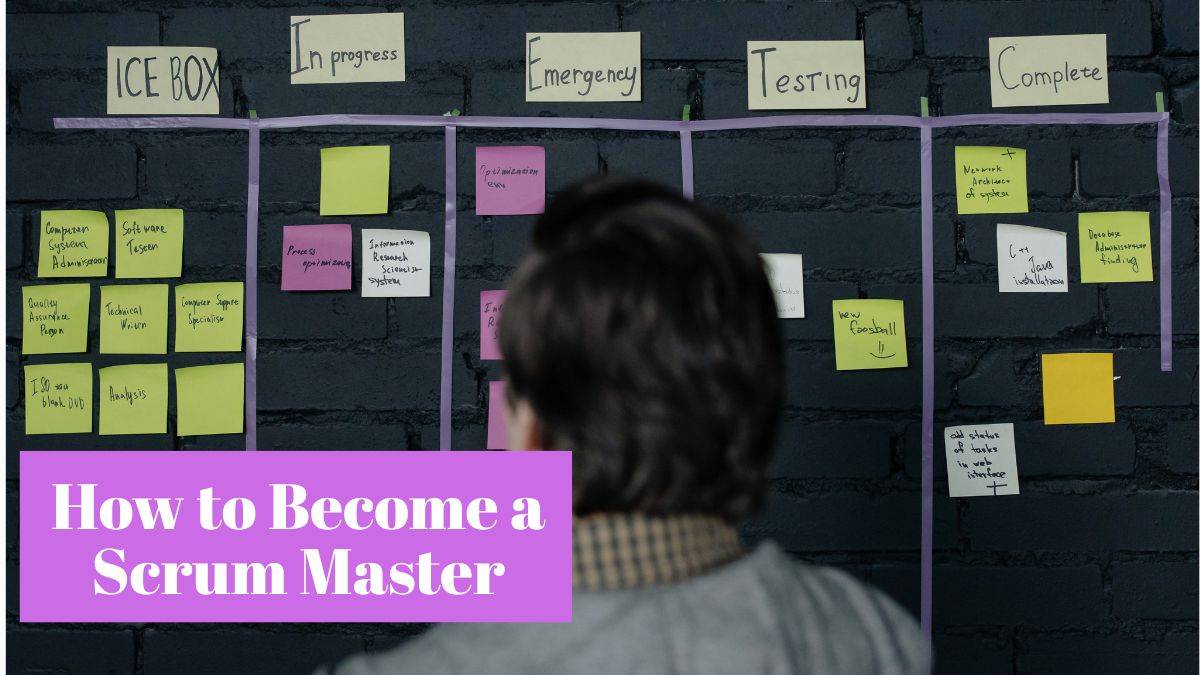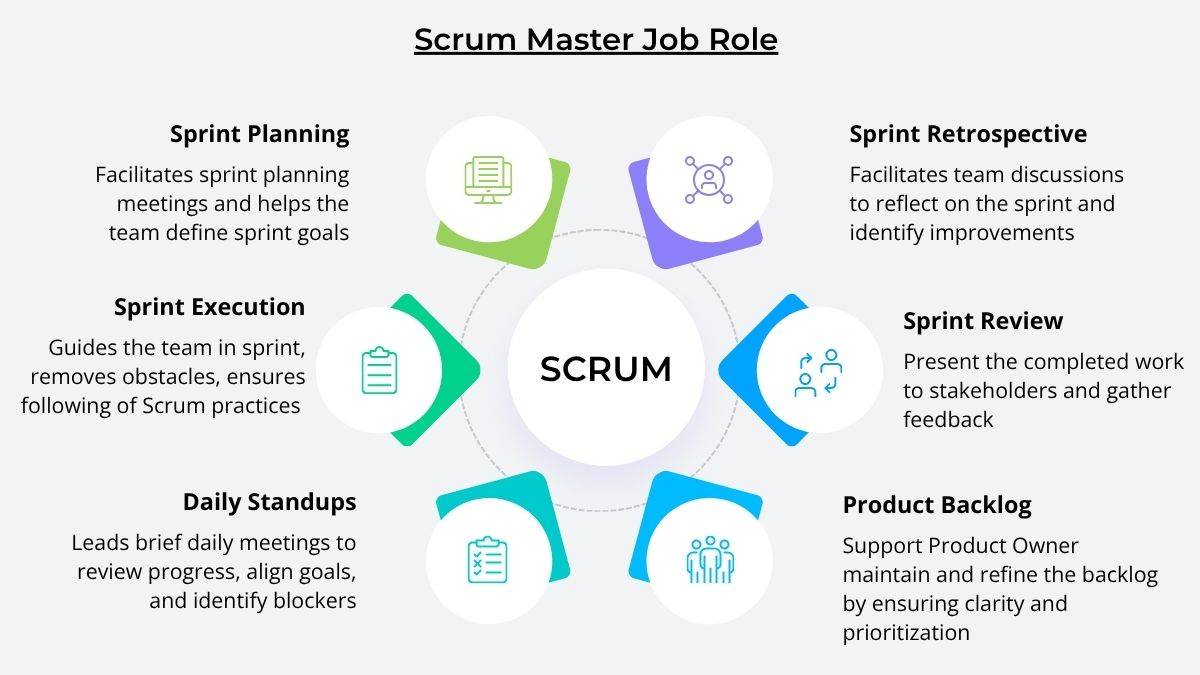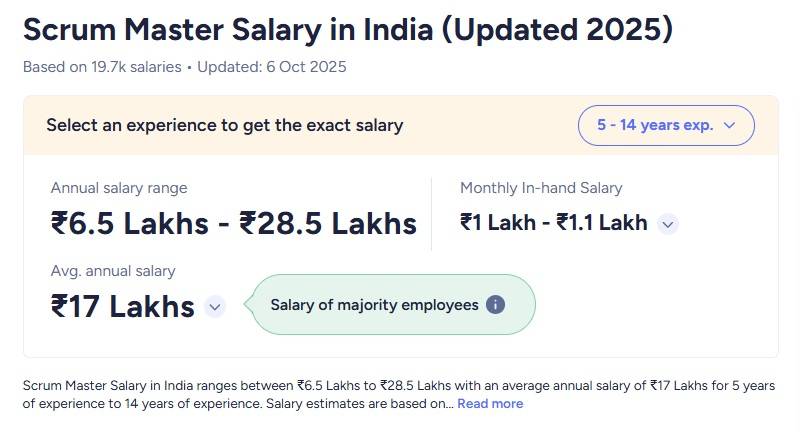How to Become a Scrum Master: Kickstart Your Agile Journey
A Scrum Master implements Scrum practices in software and product development. They are among the most in-demand roles in tech companies. In this blog, learn how to become a Scrum Master. Explore everything you need to know about the position, scrum master salaries, top skills, and top scrum courses and certifications.
- What is a Scrum Master? What Do They Do?
- Popular Scrum Certifications
- How to Become a Scrum Master
- Tips to Crack the Scrum Master Exam
- Top Scrum Master Skills
- Scrum Master Salary in India
What is a Scrum Master? What Do They Do?
Scrum Master plays a key role of a leader and facilitator and helps the team in the process of implementing Scrum by removing the limitations that the team members confront in carrying out their work and by arranging the events that are significant like planning, stand-ups, and retrospectives. They do not manage the tasks directly; on the contrary, they assist the team in their continuous improvement, cooperation with the product owners, and the establishment of the agile culture at the team level.
One of the main responsibilities of the scrum master is to guard over the compliance of the requirements that are laid down in the scrum model. Besides, they provide their help to the product owners in handling the product and sprint backlogs, which are the lists of tasks and assignments of tasks to team members, respectively.
The Scrum Master can thus be seen as the intermediary between the client (or Product Owner) and the Scrum team whose direction they take.
Popular Scrum Certifications
Listed below are the top industry-recognised Scrum certifications offered by the top providers.
Scrum.org
- Professional Scrum Master I - III
- Professional Scrum with Kanban Certification
- Professional Scrum with User Experience Certification
- Professional Scrum Product Backlog Management Skills Certification
- Scaled Professional Scrum Certification
- Professional Scrum Facilitation Skills Certification
Scrum Alliance
- Certified ScrumMaster (CSM)
- Advanced Certified ScrumMaster (A-CSM)
- Certified Scrum Professional ScrumMaster (CSP-SM)
Scaled Agile
- SAFe® Scrum Master
- Advanced Scrum Master (ASM)

How to Become a Scrum Master
If you want to become a Scrum Master but don’t know where to start, here’s a clear step-by-step guide you can follow.
1. Choose the Right Certification
There are different Scrum Master certifications, such as Certified ScrumMaster (CSM), Professional Scrum Master (PSM), Scrum Master Accredited Certification (SMAC), etc. Each course has a different objective, format and costing. You are advised to check the syllabus of each course, difficulty level (beginner, intermediate, or advanced), and market recognition. Choose the one that matches your career goals and/or job requirements.
2. Take a Preparatory Course
Though it is not mandatory to join any preparatory course before taking the certification exam, it is highly recommended. With the help of an official course, you will get a realistic idea of the exam structure, learn from experts, and practice exercises that are based on the exams.
We recommend selecting a course that aligns with your chosen certification. Some of those popular preparatory courses are:
- Agile Scrum Foundation by Simplilearn
- IBM - Introduction to Agile Development and Scrum on Coursera
- Agile and Scrum Foundation Certification Training by Simplilearn
- Certified Scrum Master: Scrum Methodologies by Coursera
- CSM Certification Training by KnowledgeHut
- Agile Fundamentals: Including Scrum and Kanban by UDEMY
Depending on the training you choose, you can become certified or accredited as a scrum master. Accreditation involves taking the online exam without supervision, while certification involves taking a proctored exam.
3. Prepare for the Exam
Any certification you are going to take up would require a detailed plan to crack. You need to prepare a study plan and follow it. Focus on Scrum principles, roles, events, artefacts, and agile values. Keep tracking your progress every week to see whether you are ready.
4. Take the Scrum Master Exam
Book your exam only if you feel confident. Read questions slowly and understand them before answering. Learn to optimise your time and do not waste too much time on one question. Don't panic and believe in your preparation.
After clearing your exam, you will be given a Scrum Master certificate that will boost your career in agile project management.
Tips to Crack the Scrum Master Exam
Scrum is not something you can mug up. Here are some handy tips that can help you crack the exam:
- Use exam simulators and practice tests
- Here is the latest official Scrum Guide, written by Ken Schwaber and Jeff Sutherland - the founders of Scrum. This covers the concepts, roles, events, and artefacts you need to know: Scrum Guide (November 2020)
- If possible, work with agile teams or join mock projects: offer your services or join a team.
- You can strengthen your knowledge and build confidence before taking up the exam by training with guided programs such as a Business Agility Scrum Master course.
- Join communities like Reddit or Quora and go through the common mistakes that other examinees have made. Learn from them
- Keep revising
Top Scrum Master Skills
As a scrum master, you need a wide range of skills. The most important ones are listed here:
Technical Skills for Scrum Masters
Since a Scrum Master's daily duties involve organizing meetings and tracking the team's work and progress, here are some core technical competencies that you need to develop:
- Experience with agile project management tools. For example: JIRA, Trello, Asana or Azure DevOps
- Team collaboration tools such as Slack, Microsoft Teams or Zoom
- Visual collaboration tools such as Miro or Lucidchart
- Data analysis and reporting tools such as Power BI or Tableau
- Document management and sharing tools like Microsoft Excel and Google Sheets
- Customer relationship management (CRM) software
- Basic knowledge of programming languages
Soft Skills for Scrum Masters
Agile processes heavily rely on their team members, which is why the Scrum Master must have excellent communication and collaboration skills.
- Communication
- Facilitation
- Leadership
- Troubleshooting
- Critical thinking
- Time management
Scrum Master Salary in India
According to AmbitionBox, the average salary for a Scrum Master lies in the range of INR 6.5 - 28.5 LPA.
Listed below are the city-specific salaries for scrum masters. Average experience range is 5 - 14 years.
| City |
Average Salary |
Average Salary Range |
| Bangalore |
INR 17.5 LPA |
INR 7 - 29.8 LPA |
| Pune |
INR 17.2 LPA |
INR 7.2 - 28 LPA |
| Gurgaon |
INR 17 LPA |
INR 6.8 - 29 LPA |
| Hyderabad |
INR 16.8 LPA |
INR 6 - 26 LPA |
| New Delhi |
INR 16.7 LPA |
INR 6.5 - 28.2 LPA |
| Noida |
INR 16.6 LPA |
INR 7 - 28.8 LPA |
| Chennai |
INR 16.4 LPA |
INR 6 - 25 LPA |
| Mumbai |
INR 16.3 LPA |
INR 6.5 - 26.4 LPA |
| Kolkata |
INR 15.2 LPA |
INR 5 - 20.8 LPA |
| Kochi |
INR 15.1 LPA |
INR 6.3 - 23 LPA |
Salaries: AmbitionBox as of November 2025

 Call 8585951111
Call 8585951111


Rashmi Karan is a writer and editor with more than 15 years of exp., focusing on educational content. Her expertise is IT & Software domain. She also creates articles on trending tech like data science,